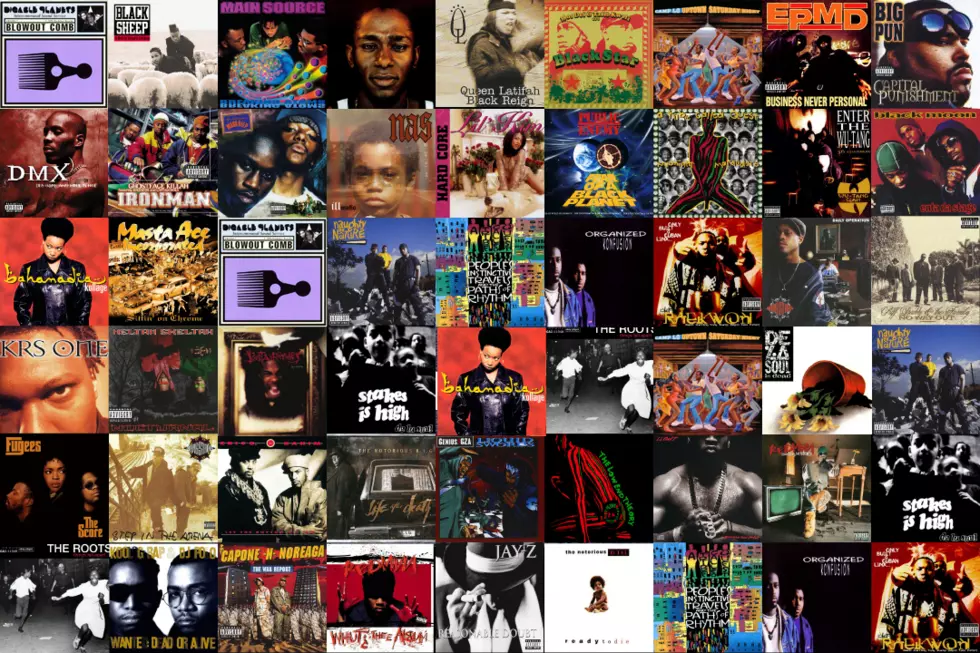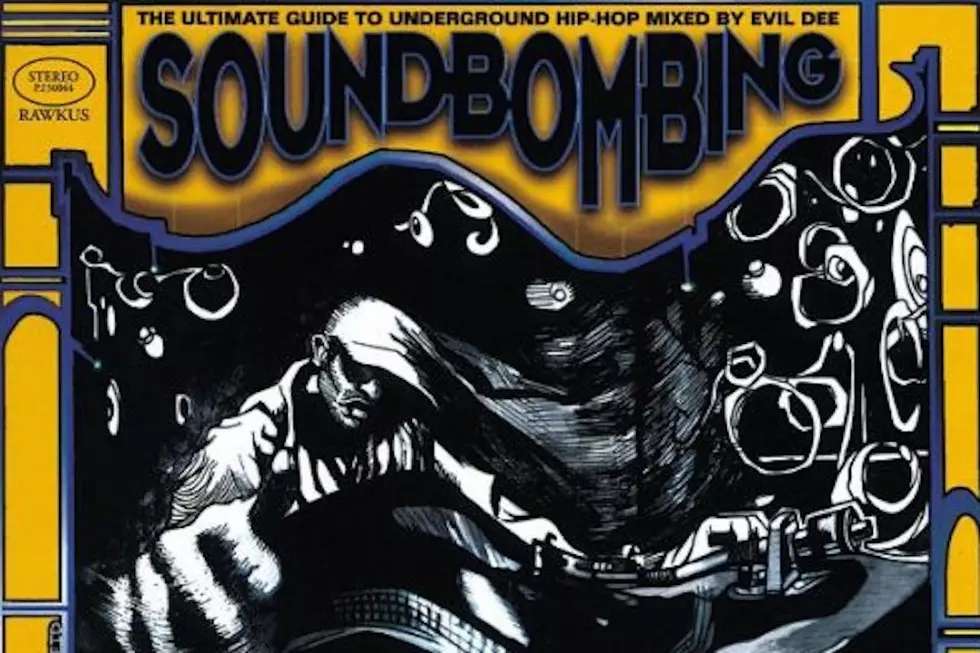
Company Flow’s ‘Funcrusher Plus’ Epitomized Hip-Hop’s Spirit of Independence
The late 1990s saw hip-hop at a crossroad; as the genre had exploded commercially in the wake of popular releases by juggernaut labels like Death Row Records and Bad Boy Entertainment; as well as the emergence of an indie ethos that sought to reclaim the artform away from its more commercial leanings. Company Flow was a trio of NYC natives that would stamp themselves as torchbearers for the indie rap movement in the wake of their critically-acclaimed debut, Funcrusher Plus.
ElComprised of rapper/producer El-P, rapper Bigg Jus, and DJ Mr. Len, Company Flow's story begins in 1993, when founding member El-P, who was 17 years old at the time, had already begun to make waves as a prodigious emcee, hooked up with Anttex, who would bring El-P into the fold at Libra Records, a small, Long Island based indie label. First meeting Mr. Len, who was an intern at the label, El-P would eventually bring in Bigg Jus, another Libra employee, completing the group's cipher by the time the group's debut single "Juvenile Techniques" was released that same year, which helped put Company Flow in the good graces of underground tastemakers, who gravitated to the group's fresh, avant-garde sound. Two of those tastemakers would be acclaimed curators DJ Stretch Armstrong and Bobbito Garcia of Stretch & Bobbito fame, who would champion Company Flow during the group's formative years, having the group appear on the show and spinning their earliest demo recordings, many of which would wind up on the group's 1996 EP, Funcrusher.
After being rejected by labels Loud and Tommy Boy, Company Flow would take matters into their own hands, releasing Funcrusher Plus independently on Official Recordings, effectively shunning the major label system and coining their influential credo of being "independent as fuck." That attitude would prove to define one of the more impactful movements of the decade and inspire a number of rap's greatest talents that have emerged over the past two decades, making the group vanguards and setting the tone for the rise of Rawkus Records, with whom Company Flow would release an extended version of the Funcrusher EP. Rawkus, which was founded by Brian Brater and Jarret Myer, helped revolutionize the indie scene with a succession of critically-acclaimed projects from the undergrounds finest, including the likes of Mos Def and Talib Kweli, but its first full-length release was Funcrusher Plus, making the trio the flagship artists of the label.
More than the standard order of operations, Rawkus symbolized what many true-school enthusiasts and rap junkies felt had become missing in hip-hop with the genre's hyper-commercialization in the mid-90s. 1997 was the year of Puff Daddy and Bad Boy Records, so Rawkus and Company Flow stuck out like a sore thumb and was regarded as the antithesis of the brand of rap that dominating the Billboard charts and radio at the time. “Hip-hop had just had its first major period of becoming pop music I think, right before we came out," El-P remembered during a 2012 interview with FactMag. "It had gotten a little shiny [laugh]. And that’s not the way that we lived, that’s not the way we came up. We lived the culture, we were into graffiti, we were into different things. That’s not how we saw it. And we wanted was that every time our record came on, it just completely shitted on everyone, and stood out completely."
If blowing the minds of rap fans in search of an alternative to the norm was Company Flow's goal with Funcrusher Plus, those expectations were exceeded when the album was released, with the trio turning in a body of work that would stamp them as torchbearers for the style of bare-bones NYC rap that would counter the more glossy and murderous sounds permeating out of the five boroughs. "Yo' eyes get, blind like 2Pac gettin shot in the lobby/Most MC's styles is robbery of my freestyles as a hobby," Bigg Jus rhymes on "Bad Touch Example," a visceral couplet from Funcrusher Plus' opening number that sets the bar for quotables at a high and captures listeners attention off the rip. However, Funcrusher Plus truly finds its footing with the El-P produced banger "8 Steps to Perfection," one of the selections from the EP version that transformed Company Flow into underground darlings and created anticipation for their full-length offering prior to its release.
Samples from "Telephone Line" by Electric Light Orchestra, and Harlem Underground Band's "Smokin' Cheeba Cheeba," are both lifted for "8 Steps to Perfection," with El-P complimenting it with bombastic percussion, as well as a crafty nod to the New York Knicks squad with the line "Yo, motherfuck the Houston Rockets," a testament to Company Flow's unabashed reverence for their hometown. Funcrusher Plus contains a multitude of references to wrinkles unique to the five boroughs, including "Lune TNS," a Bigg Jus produced selection that finds the rapper flying solo and detailing the names of notable graffiti artists that contributed to the street art renaissance of '80s and '90s NYC. "The elevated trainline of the J line and the A/Where I first encountered the likes of Baby168/Stan, Iz the Wiz, K56, T.K.A/Kingpin throwups and way back then was it," Bigg Jus reminisces, crafting a track that is equally entertaining as it is informative and is among the stronger inclusions on their full-length debut. El-P, who produced a majority of Funcrusher Plus in addition to sharing lyrical duties with Bigg Jus, takes a solo turn of his own with "Definitive," before taking it back to the group's beginnings on college radio on the interlude "89.9 Detrimental" and "Vital Nerve," the latter of which includes one of the few guest appearances on the part of BMS.
Known for his disdain for the conversations and ethos surrounding hip-hop in the mainstream realm, El-P speaks to him and his group's stance on the state of the culture in 1997 with the line "With hip-hop guidelines I state I never liked authority/When sales control stats I place no faith in the majority" foreshadowing the increased attention to metrics when appraising an emcee's worth, a sentiment that is peppered throughout Funcrusher Plus in bits. In addition to "Vital Nerve," other offerings from Company Flow's debut that boast costars include "Collude/Intrude," which features J-Tred," the R.A. The Rugged Man assisted "Population Control," and the high-powered posse cut "The Fire in Which You Burn," a collaboration between the trio, J-Treds, and The Juggaknots member Breeze Brewin'. Funcrusher Plus revolves around its beats and rhymes, but the more pressing aspects of life go largely unaddressed, but one track that sheds light on their personal matters is "Last Good Sleep," on which El-P touches on his strained relationship with his stepfather, a precursor to the more introspective and revealing work that would become a signature of his artistry in later years.
Funcrusher Plus would arrive without much fanfare in comparison to other blockbuster releases that were unleashed in July 1997 and miss the casual fan's radar due to its lack of a hit single, however, the album would catch fire among indie-rap enthusiasts and alt-rap mavens, who gravitated towards the group's lyrical exploits and El-P's abstract production. When asked of the public's reception to the album upon its release, LP shares that he feels the sheer authenticity surrounding their aesthetic and music played a huge part in their success. "I think the energy of it resonates, there’s a rebellion to the sound, and we were just on some, ‘fuck all this shit’," he once shared. "Our whole attitude was to be the rawest we could possibly be, and I think that just came through as something special. At the time, I don’t think that anyone had really heard our sound before, but our attitude was evidently rooted heavily in hip-hop, in the attitude of hip-hop." Setting the tone for Rawkus' emergence as a power player within the rap landscape, Company Flow's debut would give the label credibility with critics and fans alike, helping pave the way for landmark releases like Soundbombing, Lyricist Lounge Vol. 1, Mos Def & Talib Kweli are Black Star, Black on Both Sides, and Pharoahe Monch's Internal Affairs, all of which would be deemed definitive efforts during a golden era for the independent rap scene.
Despite Funcrusher Plus being the trio's lone studio album, (they would break up in 1999 and pursue solo careers), Company Flow remain a legendary rap group in the annals of the underground, they're name still garnering high praise and respect within the community. Company Flow's potential may have been unfulfilled prior to disbanding as a group, however, Funcrusher Plus is a certified classic that helped wave the flag for independent, progressive hip-hop, remains one of the more acclaimed debuts of its era.
More From TheBoombox







![Run the Jewels Immortalized Themselves As Gun-Toting Statues [PHOTO]](http://townsquare.media/site/625/files/2014/10/runthejewels.jpg?w=980&q=75)
![Run The Jewels Deliver Politically-Charged ‘Legend Has It’ Video [WATCH]](http://townsquare.media/site/625/files/2017/03/Run-The-Jewels-Legend-Has-it-Video.jpg?w=980&q=75)
